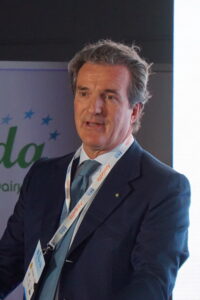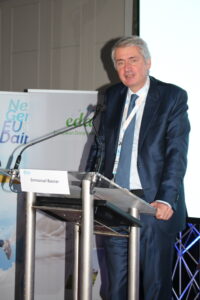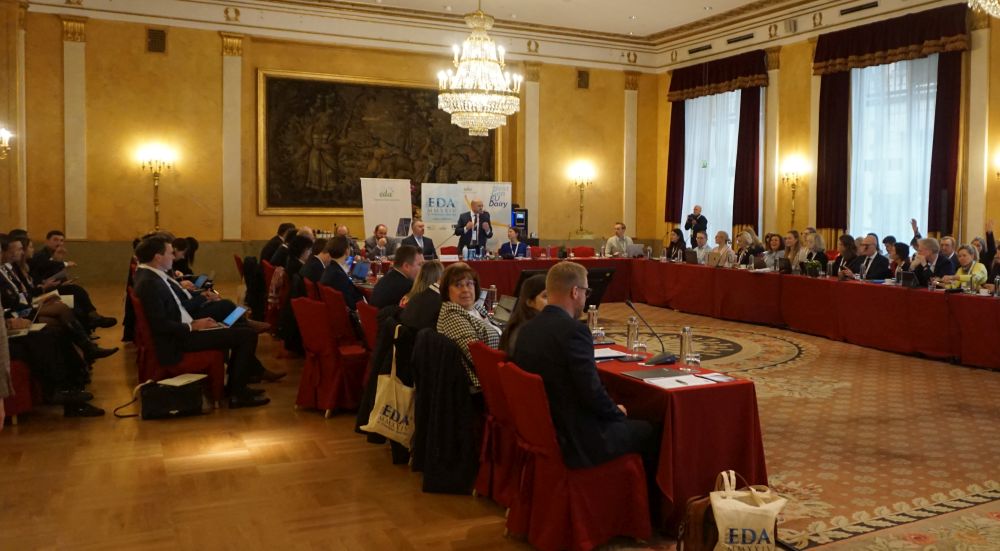The annual congress of the European Dairy Association (EDA) took place in Rome on November 15, 2024. Giuseppe Ambrosi, President of the EDA, prepared the participants for the major challenges facing the dairy sector. Issues such as sustainability, energy management in agriculture and the change in demand for dairy products pose new difficulties for the dairy industry. With a view to Brussels, Ambrosi added: “We cannot be defensive, but must continue to make our voice heard in Brussels.” The three most important pillars from the EDA’s point of view are the inter- nal market, an ambitious trade policy and the Common Agricultural Policy.

High-ranking participants from the dairy industry and and politics were present at the event. In addition to Emmanuel Besnier, CEO Group Lactalis, Gianpiero Calzolari, President Granarolo, Pat Murphy, CEO Kerry Group, James Neville, CEO Volac, and Jan Vreugdenhill, Director Vreugdenhill, were also present and discussed the current situation of the dairy market. Francesco Lollobrigida, Minister of Agriculture, Food Sovereignty and Forestry and Herbert Dorfmann, European Parliament were present from the political arena.
High milk price, but …
The current high milk price paid to farmers is encouraging. Nevertheless, there is a risk that the number of dairy farmers will decrease. This will make it more difficult to secure sufficient quantities of milk. Jan Vreugdenhil commented: “In the Netherlands, 99% of our milk comes from our own farmers. But we are also increasingly looking to source raw materials from neighboring countries such as Belgium and Germany. Of course, this is partly due to the fact that the number of milk-producing farms is decreasing. Even if individual farms are producing more milk due to higher cow numbers, the volume of milk is still declining.”
During the panel discussion, it was agreed that there is a lack of young talent in agriculture as well as in production and processing. More framework conditions need to be created to make the professions attractive. In addition to remuneration, components such as digitalization and social framework factors must also ensure the next generation of skilled workers. The panel agreed that the competition for attractive professions for young people is fierce.
Consumers and markets

With regard to the consumption of and demand for dairy products, it was noted that young consumers in particular are becoming more critical. Influencers in particular are opinion leaders who have a large following and credibility among young people. The dairy industry must therefore be active in such networks in order to communicate the topics of agriculture, energy, sustainability and carbon footprint, said Gundalina Graffigna, Professor at the University of Cattolica del Sacro Cuore. She added that, on the one hand, young consumers are increasingly focusing on factors such as the origin, composition and social issues of a product. On the other hand, there is a risk of misinformation through social media. In addition to the self-proclaimed experts on he internet, this is a very big problem. It is therefore important to inform consumers more with facts rather than just emotional advertising.
Europe should also continue to open up to new markets. In addition to traditional markets such as Asia, South America and the USA, Pakistan and Brazil are promising countries, according to Emmanuel Besnier, CEO Group Lactalis. However, he believes that the Chinese and US markets will change. China is increasing its level of self- sufficiency and the USA may impose im- port tariffs under the new President Trump, Besnier continued. The industry should prepare for this.
There is still a demand for vegan products among consumers, albeit at a low level. Milk remains in high demand as a staple food. A high degree of processing or the use of individual components of milk, such as protein, would attract a great deal of interest from consumers and the processing industry worldwide. Products from the EU are in high demand worldwide.
With regard to sensible and – in the view of the associations – nonsensical regulations from Brussels, each individual country in the EU should continue to show its strengths. Pat Murphy, CEO Kerry Group, mentioned that cows in Ireland, like in New Zealand, spend more time on pasture than in any other country. Milk production in Ireland is the leader in terms of carbon footprint . Another idea could be to look into the potential added value of hybrid products. Gianpiereo Calzolari, President of Granarolo, added that tradition is important and must not be touched. However, the company is open to new topics with rather small changes.”



